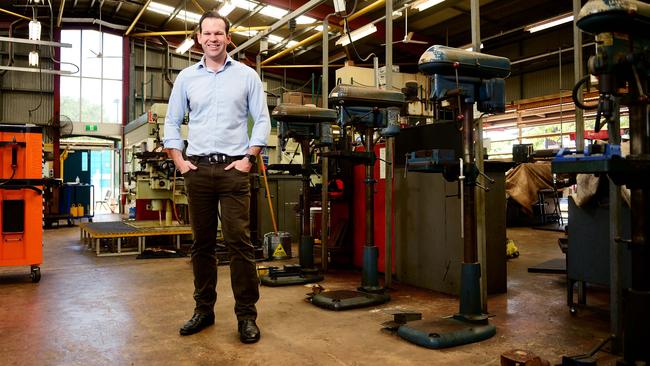Matt Canavan plays plays down US-China trade fears
Resources Minister Matt Canavan has played down fears about an emerging trade war between the US and China.

Resources Minister Matt Canavan has played down fears about an emerging trade war between the US and China, highlighting the surge in US energy exports and the “opportunities” US tariffs presented for Australian exporters.
Following the release of unpublished Reserve Bank modelling that was inconclusive about the impact of US tariffs on the Australian dollar, Senator Canavan said any impact for Australia from the third round of US tariffs on China, which took effect yesterday, would be “indirect”.
“We will have opportunities to increase our trade with Asia because of US protectionism, but at same time tariffs and barriers reduce economic growth and we benefit from economic growth,” he told The Australian.
“There is a lot of negative talk about trade wars but we should not let rhetoric distract us from the facts.”
Last week, US President Donald Trump announced a 10 per cent tariff on $US200 billion ($275bn) worth of Chinese imports, and threatened a 25 per cent tariff on a further $US267bn worth by the end of the year if China retaliated.
China has since announced tariffs on $US60bn a year of US imports, and withdrawn from planned trade talks with the US.
“I share concerns over moves to greater protection especially on manufactured goods, but we’ve seen an enormous freeing up of trade in energy in the past few years and this is a great positive for the world, especially our region,” Senator Canavan said.
Economists have overwhelmingly panned the US President’s imposition of tariffs on Chinese imports and his plans to tear up trade deals with Canada and Mexico. Senator Canavan, Nationals senator and protege of former deputy prime minister Barnaby Joyce, said “no one is ever pure on trade”.
“Over the past few years, the US has become an exporter of energy for the first time since the 1950s; despite broadly being advocates for free trade, the US had sort to keep its own energy for domestic purposes,” he added.
Freedom of information laws resulted in the release of Reserve Bank modelling last week that concluded the dollar could appreciate or depreciate following a global trade war where every country slapped a 20 per cent tariff on every other country’s imports, including Australia’s. The unemployment rate would increase by 0.25 percentage points and GDP would shrink by 1 per cent by 2021, it estimated.
“A deterioration in global economic conditions, heightened risk aversion and a fall in commodity prices would typically be associated with a depreciation of the Australian dollar,” it said.
“On the other hand, Australia may be less exposed to (a trade war) than other countries that rely more on traded goods as a source of demand for their products and have a larger manufacturing sector,” it added, positing that the local unit could jump 6 per cent in value in other circumstances. The dollar has increased in value by about US1c over the past week to US72.6c yesterday.
Since the US first imposed tariffs in April, its imports from China have increased 23 per cent to $47bn. US exports to China have been stable at $US10.2bn a month, according to official US data.
The RBA analysis said if Chinese export volumes to the US fell by a quarter to a half, Chinese GDP growth would slow by at most two percentage points — “which is not insignificant”.
“Since Trump was elected, US exports and imports have increased by an amount which on anyone’s measure is remarkable growth,” Senator Canavan said.
“Their energy exports are a competitive threat to our resource exports but we must be consistent and always advocate free trade, which will lead to higher economic growth which ultimately benefits.”
The impact of the earlier round of tariffs on steel would be “negligible” for Australia, the analysis, conducted in March, found.
“Even without the exemption on Australian products, the impact would be small,” the RBA analysis added.




To join the conversation, please log in. Don't have an account? Register
Join the conversation, you are commenting as Logout